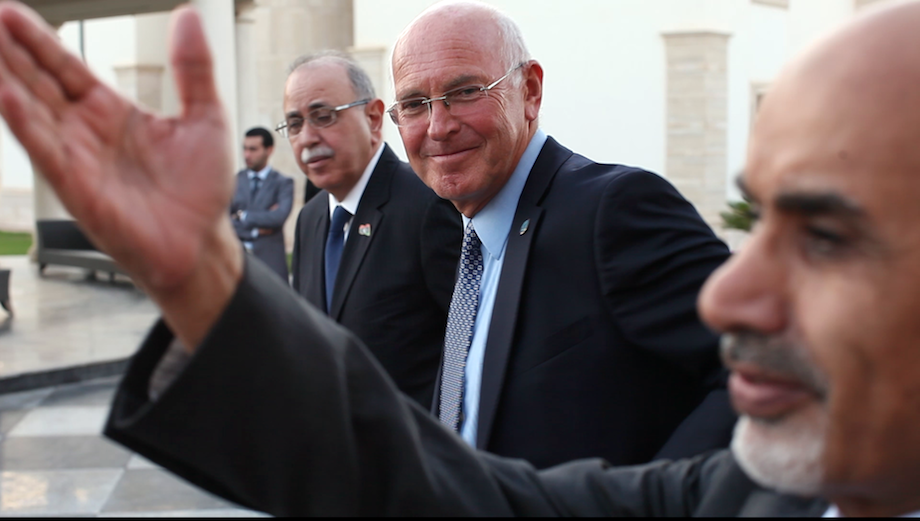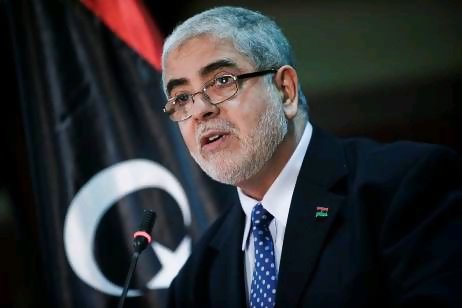By Michel Cousins.

Tripoli, 1 October:
Twice in its history, the UN has played a decisive role in Libya’s life. The first time . . .[restrict]was at independence. The country was in effect voted into existence in 1951 by the UN. No other country can claim that distinction.
Much of the work preparing the path for Libya’s emergence as an independent, united single state was done by Dutchman Adriaan Pelt.It led to a grateful Libya naming major streets in Tripoli and Benghazi after him. Qaddafi so hated anything to do with Libyan independence that he changed them. Shara Adriaan Pelt in Tripoli became Shara Al-Fatah and in Benghazi it was renamed Shara Abdel-Moneim Riad.
The UN’s second impact was last year, starting with the revolution.
After the 17 February uprising, UN resolutions 1970 and 1973 not only prevented Qaddafi from crushing the revolution but in effect allowed it to grow and succeed. However, the UN’s role since then has been about much more than Security Council votes, crucial though they were for the course of the revolution. During the past 18 months, the UN has provided an significant guiding hand to the new Libya.
Its primary activities in the country during the period have been directed by Ian Martin. In an interview with the Libya Herald towards the end of last month, he spoke of what has been achieved, the priorities for the incoming government of Mustafa Abushagur, especially security, but also of his fundamental optimism about the country’s future.
Martin, who served as Secretary-General of Amnesty International from 1986 to 1992, and who in 2009 headed the UN’s inquiry into events in Gaza, was appointed last September by UN Secretary-General Ban Ki-moon as his Special Representative and Head of the UN Support Mission in Libya. In fact he had been involved earlier than that. He first arrived in Benghazi in April 2011, asked by Ban Ki-moon to prepare for what would happen in Libya when the conflict ended. In reality, even as early as that the UN was already focussed on a post-Qaddafi Libya.
Between April and last September when Martin was formally appointed to lead the UN’s presence in Libya and the Qaddafi regime was in its final death throes in Sirte, he and a small UN team developed three principles that were to govern the UN’s new involvement in Libya. They were, he said, Libyan ownership of the political process, a recognition of the uniqueness of Libya and effective coordination.
By the first, Martin meant that whatever happened or was approved, it had to be Libya’s decision, not something decided and imposed by the UN. The role of the UN was to be a facilitator — but a facilitator whose advice was wanted and heeded.
“Libyan voices were always clear about the need for UN assistance”, Martin noted.
In regard to the uniqueness of Libya, the point he makes is that Libya is different to other countries that had gone through massive political upheaval. For example, unlike say, Afghanistan, Libya has not needed UN assistance to rebuild itself. It can afford to pay for its own redevelopment.
Early in the transition stage, according to Martin, the former leader of the National Transitional Council, Mustafa Abdul Jalil, made it clear that Libya needed UN help in three areas: the holding of free elections, the re-establishment of public security and the introduction of an impartial justice system.
The task was to marry these three key Libyan objectives to the UN’s three key principles of action.
The elections, eventually held on 7 July, presented a major challenge both in themselves and in balancing the desire not to been seen to be running them yet ensuring that they took place as planned and were a success.
Libya had had no experience of free and fair elections for over 43 years. Even in the time of the monarchy, the process was not fully democratic; a number of members of parliament were appointed.
During the July elections, the principle of Libyan ownership of the process was rigidly maintained. The involvement of the UN election team, working actively behind the scenes, was largely unknown to the Libyan public — deliberately so. When the media reported that the High National Election Commission (HNEC) was working in collaboration with UN election team, an email or phone call often ensued to emphasise that the UN were in a supporting role.
“I’m extremely proud of the work of our election team”, Martin said. But he also paid credit to the HNEC with whom the relationship was, as he put it, “excellent” and to the thousands of Libyans who volunteered to monitor and help run the polling stations. It is clear he sees it as a UN task well done and the UN’s objective of not being seen to be in the driving seat as having been achieved.
The UN will continue to offer electoral support, Martin said emphatically, but the priority now was security. He was speaking a few hours before he was to give a eulogy at the memorial gathering for slain US ambassador Chris Stevens. The killing shocked him profoundly.
He had, he said, met with Prime Minster-elect Mustafa Abushagur who was in complete agreement about the absolute need for security. “It has to be the priority for UN assistance too”, the UN representative said.
As part of that, Martin pointed to two overriding necessities. Employment had to be found for the thuwar who had brought about the revolution, and the mass of weapons in private hands had to be “vigorously addressed”. Without these two, stability and security would be a mirage.
Security, however, was not just about weapons being handed in and the government enjoying a monopoly on the use of force. There were other related issues that the government had to focus on. Martin pointed to the matter of border security. Ensuring that people, weapons and/or goods were not being smuggled in or out of the country had also to be a key concern for the government, he said.
As to establishing a working system of justice in the country, Martin said he was “disappointed” that the government had not been able to do more, specifically in relation to those held on detention — “and we to help”. Justice was “key”, he said, to the reconstruction of Libya. The situation where people and communities had been taking the law into their own hands and exacting vengeance on perceived enemies had to stop, he insisted.
He pointed to the case of the people of Tawergha, unable to return home and subject to arbitrary attacks. What was happening in Bani Walid was another case, he said.
On the other hand, he insisted that the truth about past violations had to be brought out.
But he believes that the situation is improving and that communities are no longer taking the law into their own hands as before.
The other priority for the new government, he said, is that it must work far more effectively. “It is no secret that ministers and agencies did not work together”.
All these remain areas where the UN can provide assistance if the Libyan government wants it, he said. But providing that help is itself subject to the security situation. The UN would never pull out of Libya, unlike some foreign companies because of security issues, particularly in the aftermath of the Stevens killing. “That is inconceivable”, Martin said. But the UN had responsibilities to its staff. “Its ability to act could be constrained by the security needs of our personnel”.
But despite the killing of Stevens and the security concerns, there is none of the sense of the forbidding seen in businessmen and even some diplomats in Tripoli. He “felt positive”, he said, that the new government was going to take action on the issue. “There is a growing public mood demanding it. The great majority of Libyans want firm action to address the security situation.”
Martin speaks of finding that Libyans have “an inherited trust” in the UN. It is a remarkable claim given that during the Qaddafi era, it had little relevance or significance for most of them. Its role in the creation and independence of Libya was deliberately erased by a regime that tried to pretend that the country only began its existence on 1 September 1969. But it seems true that today there is genuine affection for the international body, an affection that must probably surprises people in other countries.
With the elections, the appointment of Mustafa Abushagur as the next prime minister and in the next day or two the announcement of a new government, one chapter in Libya’s transition history has closed while another opens. The changeover coincides with Ian Martin completing his term in post. His successor Tarek Mitri is expected to arrive in mid-October and Martin himself has now left Tripoli.
His last formal act was to speak at the memorial for Ambassador Stevens. In his speech he said that Stevens was a far greater optimist about Libya than he was.
He was not trying to suggest that he had reservations about Libya’s future; he was trying to impress the degree of the slain ambassador’s enthusiastic belief in Libya and that it would be a free, democratic, prosperous and happy nation. But Martin’s own enthusiasm for Libya and belief in the same positive outcome is no less evident when he speaks about the country.
Given that affection and what has been achieved during his time in the country, it is not altogether surprising then that in his travels around Libya this past year he has been referred to many times by Libyans as a second Adriaan Pelt. [/restrict]












